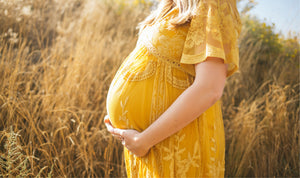Hi wonderful customers!
Today’s post is on the topic of fertility nutrition, and who better to walk us through all things preparing for conception than fertility nutritionist, Grace Kingswell. Our diets impact every aspect of our lives and our health, so it’s no wonder that there’s a huge amount of evidence to support egg and sperm health and ultimately fertility outcomes with diet and lifestyle.
-
Have you ever heard the expression “it takes 12 months to build a baby”? It’s one of my favourite ways of describing quickly and effectively just how important the 3 months before conception are for the outcome of your pregnancy (and whether you actually conceive in the first place). These days we jump very quickly to assisted reproduction, (I myself am nearing the end of my pregnancy which was conceived via the miracle that is IVF), but there’s actually so much we can do ourselves before we get to this point that will increase our chances of conceiving a healthy baby. All you need is one good egg, and one good sperm at the end of the day! So the quality of that egg and that sperm is everything.
I came across a study recently (which you’ll have to take my word for because I can’t for the life of me find it now) which was looking at levels of DHA and EPA (the two main essential omega 3 fatty acids that we get from things like oily fish) in breastfeeding women. The study actually concluded that it was the maternal status in these essential fats before she conceived, that influenced the levels of them in the breast milk - quite remarkable. EPA and DHA are essential for building a baby's brain, so definitely something you want to prioritise in your diet.
I think this example goes some way to communicating how much we can impact if we take our time to get it right. Now, of course many women conceive with ease and oftentimes unknowingly - and go on to have healthy and happy babies! I want to caveat this post with the fact that if you don’t spend the 3 months before you conceive being your healthiest self, do not worry. You can still work hard on your nutrition and lifestyle during the 9 months of pregnancy.
So why 3 months? Well, because it takes 3 months to mature an egg and ultimately it is the egg health (and sperm health) that will determine how easily you conceive and how healthy the baby is. So what foods support egg health and sperm health? And what other lifestyle factors should we be thinking about during those 3 months?
Nutrients for Egg Health
The first obvious thing to say here is that you need to be eating a well-balanced, whole foods diet. That means enough protein of a high quality to deliver all the essential 9 amino acids in the correct ratios (I could dedicate an entire blog post on optimising fertility if you’re vegetarian, but I don’t have time to do that here), good fats (i.e. not damaged fats from processed seed oils), and some quality carbohydrates, i.e. not from chips. On top of that we layer in the specifics like antioxidants that help scavenge free radicals that damage egg quality, and specific nutrients like folate which help protect against birth defects. Let’s get into some of those now, so long as we’re all on the same page about a well-balanced, mediterranean-style diet with lots of colour, diversity, veggies, fats and quality protein!!
Selenium
Selenium is thought to be involved in follicle growth and maturation, egg development as well as preventing chromosomal damage due to oxidative stress. It is found within the follicular fluid which nourishes the eggs.
Sources: brazil nuts, organ meats and seafood.
CoQ10
Co-enzyme Q10 is an oil soluble component of all cell membranes and studies have shown that it restores mitochondrial function (the mitochondria are the little power houses of the cell) in the egg during reproductive aging. One human study showed that women aged 35-40 receiving 600mg of CoQ10 daily had improved pregnancy rates and better quality eggs than those that did not supplement. It’s actually particularly key for sperm health too.
Sources: oily fish, organ meats and whole grains.
Zinc
Another one for both egg health and sperm health; in fact zinc is probably the most important nutrient to consider as the male partner, as the ejaculate contains high levels of zinc and it needs to be replenished by the body. Zinc is needed at all stages of egg maturation, with one study showing that eggs needed a 50% extra boost in zinc in order to fully mature. The World Health Organisation estimates that 17% of the global population is vulnerable to zinc deficiency in their diet.
Those who are at risk include people with dietary and disease factors that also affect zinc status such as irritable bowel syndrome, Crohn's disease, gastrointestinal disorders and liver disease; women facing food insecurity; or women with certain dietary restrictions, such as vegetarians or vegans who don't take supplemental zinc.
Sources: Oysters (by far the highest zinc levels), red meat, grains and legumes, poultry.
Vitamin B6
Low levels of vitamin B6 may contribute to poor egg quality, with conception increasing by 40% and miscarriage decreasing by 30% in one study. This is not surprising, considering the role of B6 in energy production. It’s always best to get your B vitamins as a complex (i.e. all together), and most good-quality prenatal multivitamins do just this.
Folate - Vitamin B9
Folate is thought to decrease the risk of neural tube defects. It also helps: Lower the risk of infertility, lower the risk of miscarriage, increase success rates in assisted reproduction cycles (ART), increase the number of eggs retrieved in ART cycles, improve the maturation and quality of eggs and counterbalance free radicals and reduce oxidative stress
Folate is depleted by heavy drinking, the birth control pill, coeliac disease and IBD.
Sources: dark green leafy veggies are your go-to here, but it’s recommended to take supplemental folate due to its vital importance.
I could go on and on (let’s not forget B12 which has been shown to improve success rates of IVF, and omega 3 from oily fish as mentioned above), but for fear of wearing you out by the time you finish this blog post, I’ll wrap up! Needless to say there’s a lot to consider, and I haven’t even gone into things to avoid (mainly alcohol, smoking, processed food, excessive stress, lack of sleep etc).
It’s also a really good idea to think about your environment pre-conception too - do you walk to work along a very busy, polluted London road? Do you get regular manicures, spray tans or use conventional cleaning products in your home? Wrap your food in plastic? All of these toxins contain endocrine (hormone) disrupting chemicals that can affect your fertility status - and I’m always careful to go through my clients’ bathroom cabinets with them in the pre-conception phase for exactly this reason! BPA, found in plastic, has been linked to reduced sperm quality too in a recent 2010 study, and ‘BPA free’ is almost worse, as they’ve replaced BPA with BPS - which is in many cases, more toxic!
My parting words of wisdom to you would be this: eat well (seek advice if you are vegan or vegetarian on how to make sure you’re getting what you need as it’s just a lot harder), read ‘Real Food for Pregnancy’ by Lily Nichols PDN, CDE, and get yourself a good quality prenatal multivitamin that you can take at least 3 month before you start trying to conceive, and then continue to take during your pregnancy.
I like the Wild Nutrition pregnancy multi for most women, and the Seeking Health Optimal Prenatal for those clients needing a bit extra - plus a good quality fish oil supplement like the Life and Soul Omega from Bare Biology. And for the men, Wild Nutrition male fertility supplement contains all the antioxidants that you need to support sperm health!
(no affiliations, just brands that I like)
—
For fertility nutrition support, Grace works with couples over a minimum of a 3 month period to improve their conception chances and also work through complex cases where there may have been misscarriage or a prolonged period of trying unsuccessfully. Grace is back from maternity leave in the new year, 2023. www.gracekingswell.com

